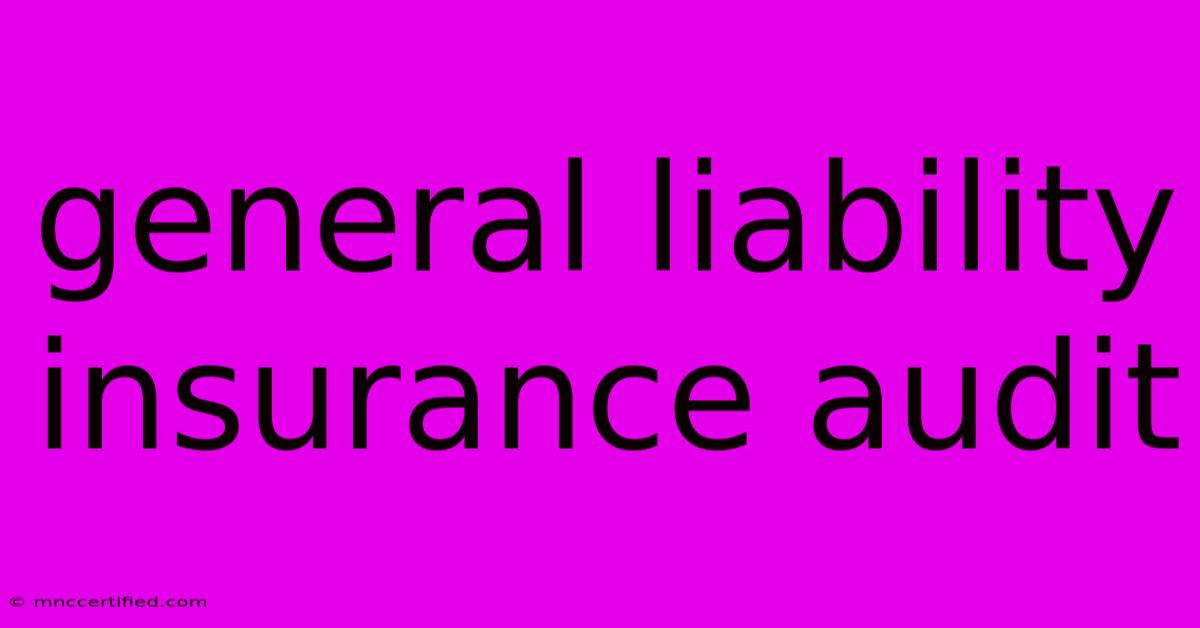General Liability Insurance Audit

Table of Contents
General Liability Insurance Audit: A Comprehensive Guide
Navigating the complexities of general liability insurance can be challenging, especially when it comes to audits. Understanding what a general liability insurance audit entails, how to prepare for one, and how to address potential issues is crucial for businesses of all sizes. This comprehensive guide will equip you with the knowledge to confidently face any audit.
What is a General Liability Insurance Audit?
A general liability insurance audit is a formal review of your business's operations and financial records conducted by your insurance provider. The purpose is to verify the accuracy of the information you provided when you initially applied for your policy and to ensure your premium accurately reflects your current risk profile. These audits are common, particularly for businesses with higher premiums or those operating in high-risk industries.
Why are General Liability Insurance Audits Necessary?
Insurance companies use audits to:
- Verify Premium Accuracy: Your premium is based on factors like your revenue, number of employees, and the nature of your business. Audits ensure these factors are accurately reflected in your premium calculation. Inaccurate information can lead to underpayment or overpayment, resulting in adjustments.
- Assess Risk: The audit helps insurers assess your current risk profile. Changes in your business operations, such as expansion or new product lines, can significantly impact your risk level and require premium adjustments.
- Prevent Fraud: Audits help detect and prevent insurance fraud by verifying the information provided by the policyholder.
- Maintain Financial Stability: Accurate risk assessment helps insurance companies maintain financial stability and ensure they can meet their obligations.
Preparing for a General Liability Insurance Audit
Proper preparation is key to a smooth and efficient audit process. Here's how to get ready:
1. Gather Necessary Documents
This is the most crucial step. You'll typically need:
- Financial Statements: This includes income statements, balance sheets, and profit and loss statements for the relevant period.
- Payroll Records: Detailed records of employee wages, salaries, and benefits.
- Business Licenses and Permits: Proof of your legal operation.
- Contracts: Relevant contracts with clients, vendors, and subcontractors.
- Insurance Policies: Copies of your current and previous general liability policies.
- Work-Related Accident Reports: Documentation of any accidents or incidents that occurred during the policy period.
2. Organize Your Records
Organize all your documents meticulously. Clearly label and date everything. Using a system that makes it easy to locate specific documents will save you valuable time during the audit process. Consider using digital organization tools for easy access and sharing.
3. Understand Your Policy
Thoroughly review your policy to understand the terms, conditions, and what information your insurer will require. Familiarize yourself with any specific reporting requirements.
4. Contact Your Insurance Agent
Don't hesitate to reach out to your insurance agent or broker if you have any questions or require clarification on the audit process or the necessary documentation. They can be invaluable in guiding you through the process.
During the General Liability Insurance Audit
- Cooperation is Key: Be fully cooperative with the auditor and provide all requested information promptly.
- Ask Clarifying Questions: If you don't understand anything, ask for clarification. It's better to address any concerns upfront.
- Maintain Accurate Records: Keep accurate and up-to-date records throughout the year. This makes the audit process significantly easier.
Addressing Audit Findings
If the audit reveals discrepancies or requires adjustments, work closely with your insurer to understand the reasons and resolve any issues. This might involve paying additional premiums or receiving a refund.
Preventing Future Audit Issues
- Maintain Accurate Records: This is the single most effective way to prevent future problems.
- Regular Policy Reviews: Review your policy annually to ensure it still meets your business needs.
- Communicate Changes: Immediately notify your insurer of any significant changes in your business operations, such as expansion, new product lines, or changes in employee count.
By following these steps, you can ensure a smooth and successful general liability insurance audit process. Remember, proactive preparation is the best defense against potential problems. Understanding the audit process and working closely with your insurance provider will significantly reduce stress and ensure your business remains properly protected.

Thank you for visiting our website wich cover about General Liability Insurance Audit. We hope the information provided has been useful to you. Feel free to contact us if you have any questions or need further assistance. See you next time and dont miss to bookmark.
Featured Posts
-
Does Insurance Cover Electrolysis
Nov 19, 2024
-
Jolies Chic Night Out Look
Nov 19, 2024
-
8 1 Intro To Insurance Answer Key
Nov 19, 2024
-
Storm Shadow Missiles Uk Aid To Ukraine
Nov 19, 2024
-
Daikin Park Astros New Stadium Name
Nov 19, 2024